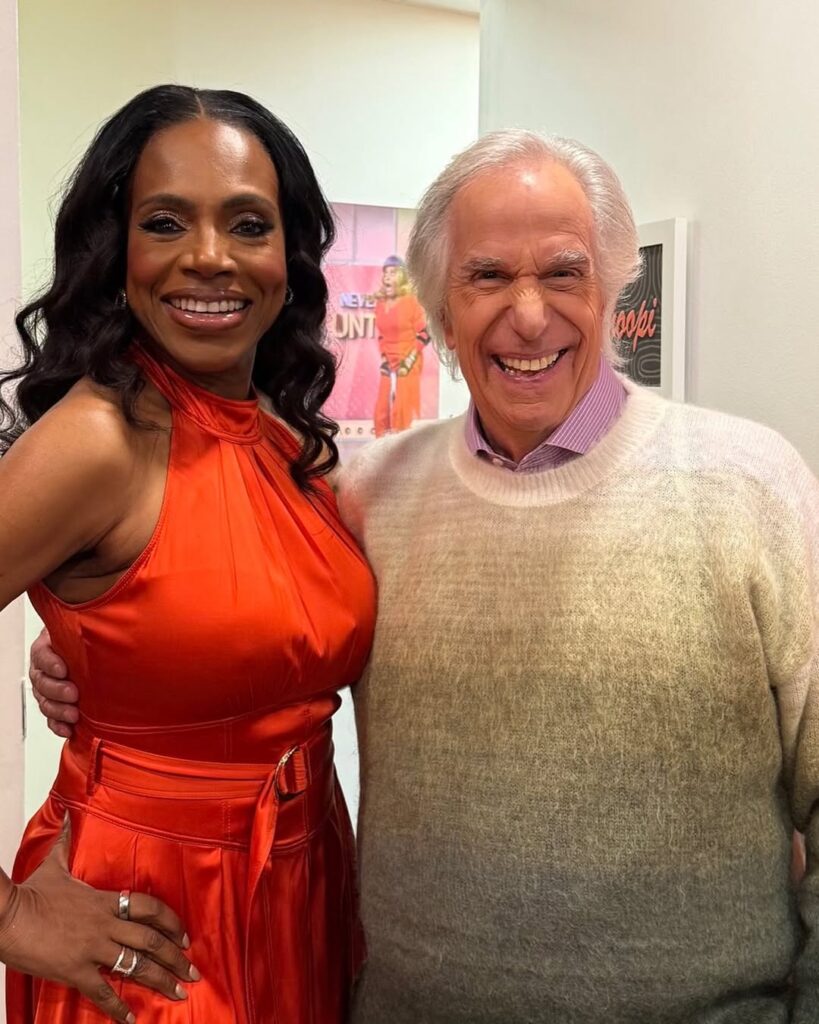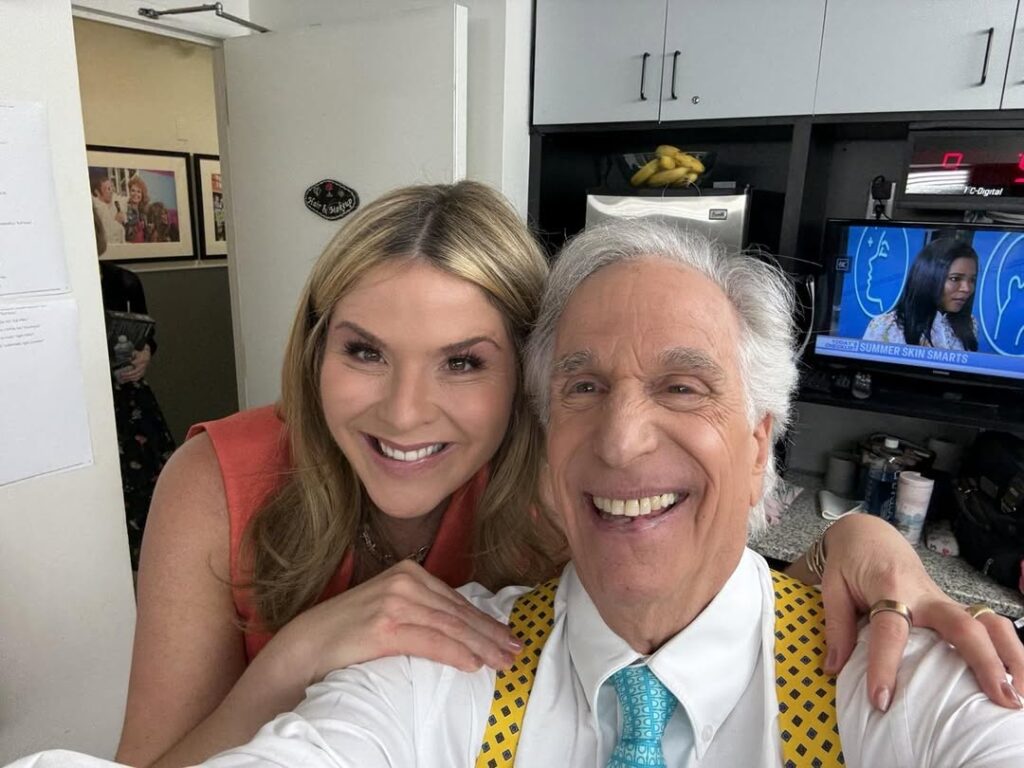Henry Winkler is a beloved American actor, producer, director, and author whose iconic portrayal of Arthur “The Fonz” Fonzarelli in Happy Days made him a household name in the 1970s. With a career spanning over five decades, Winkler has built an impressive fortune through television, film, producing ventures, and children’s book writing.
Despite struggling with undiagnosed dyslexia throughout his education, he overcame enormous challenges to become one of Hollywood’s most respected entertainment figures. His recent Emmy-winning performance in the HBO series Barry proves that his talent and appeal remain as strong as ever. Today, Henry Winkler net worth stands at an estimated $40 million, a testament to his diverse talents and smart career choices.
Table of Contents
Quick Bio About Henry Winkler
| Full Name | Henry Franklin Winkler |
|---|---|
| Net Worth | $40 Million |
| Date of Birth | October 30, 1945 |
| Age | 79 Years Old |
| Birthplace | Manhattan, New York City |
| Nationality | American |
| Profession | Actor, Producer, Director, Author |
| Famous Role | The Fonz (Happy Days) |
| Spouse | Stacey Weitzman (m. 1978) |
| Children | 3 (Zoe, Max, and stepson Jed) |
| Recent Achievement | Emmy Award for Barry (2018) |

What Is Henry Winkler Net Worth in 2025?
Henry Winkler net worth is estimated at $40 million as of 2025, according to multiple celebrity finance sources. This substantial fortune comes from his multifaceted career in the entertainment industry, including acting, producing, directing, and writing children’s books.
Unlike many actors who rely solely on their on-screen performances, Winkler diversified his income streams early in his career. His financial success reflects decades of consistent work, smart investment choices, and backend deals from successful television shows. The enduring popularity of Happy Days continues to generate syndication royalties, while his recent Emmy-winning role in Barry introduced him to new generations of fans and significantly boosted his earning potential.
What makes Winkler’s wealth particularly impressive is that he achieved it without ever becoming a major box office movie star. Instead, he built his fortune through television excellence, production ventures, and strategic career decisions that prioritized longevity over quick paydays.
Early Life: Overcoming Dyslexia Against All Odds
Born on October 30, 1945, in Manhattan, New York City, Henry Franklin Winkler came from a family of German Jewish immigrants. His parents, Ilse Anna Marie and Harry Irving Winkler, fled Berlin in 1939 just before World War II broke out. His father worked as a lumber import-exporter, providing a middle-class upbringing for Henry and his sister Beatrice.
Throughout his childhood and teenage years, Winkler struggled tremendously in school. He had undiagnosed dyslexia, a learning disability that made reading and writing extremely difficult. His parents, not understanding the condition, often called him “dumb” and questioned why he couldn’t perform better academically. These harsh words deeply affected young Henry, who knew he was intelligent but couldn’t understand why school was so challenging.
Despite these obstacles, Winkler refused to give up on his dreams. He graduated from McBurney School on Manhattan’s Upper West Side in 1963, though he had to complete summer school to do so. His determination led him to Emerson College in Boston, where he earned a Bachelor of Arts degree in 1967. Remarkably, he was then accepted into the prestigious Yale School of Drama, earning his Master of Fine Arts degree in 1970.
This educational journey laid the foundation for his acting career, but more importantly, it taught him resilience and determination—qualities that would define his professional life and later inspire his advocacy work for children with learning disabilities.
The Breakthrough: Happy Days and The Fonz
Henry Winkler’s big break came in 1973 when producer Tom Miller cast him as Arthur Herbert Fonzarelli in the ABC sitcom Happy Days. The show premiered in January 1974 and would run for an incredible 11 seasons until 1984, totaling 255 episodes.
Initially conceived as a supporting character, “The Fonz” quickly became the show’s breakout star. With his leather jacket, cool demeanor, signature thumbs-up, and catchphrase “Ayyyy,” Fonzie became a cultural phenomenon. The character represented the epitome of cool in 1950s nostalgia, and Winkler’s charismatic performance made him an icon.
How Much Did Henry Winkler Earn From Happy Days?
According to industry reports, Winkler earned approximately $50,000 per episode during the later seasons of Happy Days. Over the show’s 255-episode run, this would have amounted to roughly $12.75 million in direct salary—equivalent to about $35-40 million in today’s dollars when adjusted for inflation.
But the earnings didn’t stop when the cameras stopped rolling. Happy Days remains one of the most syndicated shows in television history, airing in reruns worldwide for decades. While the exact figures aren’t public, Winkler continues to receive residual payments from these syndication deals, contributing to his ongoing income stream.
The role earned him tremendous recognition, including:
- Two Golden Globe Awards (1977, 1978) for Best Actor in a Television Series – Comedy or Musical
- Three Emmy nominations (though he controversially never won for this role)
- A permanent place in television history
Interestingly, Winkler has said that being typecast as The Fonz initially hurt his career after Happy Days ended, as directors couldn’t see him in other roles. However, he eventually turned this challenge into an opportunity by pivoting toward producing and directing.

Career Beyond Happy Days: Film and Television Success
While Happy Days made him famous, Winkler worked hard to prove his versatility as an actor. During his time on the show, he appeared in several films including:
- Heroes (1977) – A drama where he played a Vietnam veteran
- The One and Only (1978) – A comedy about a wrestler
- An American Christmas Carol (1979) – A TV movie adaptation
After Happy Days ended in 1984, Winkler took a brief hiatus from acting to focus on producing and directing. When he returned to acting in the 1990s, he deliberately chose diverse roles to break free from The Fonz’s shadow.
The Adam Sandler Connection
One of the most profitable professional relationships in Winkler’s career began in 1998 when Adam Sandler cast him as Coach Klein in The Waterboy. The film was a massive box office success, grossing over $185 million worldwide. This led to roles in three more Sandler films:
- Little Nicky (2000)
- Click (2006)
- You Don’t Mess with the Zohan (2008)
These commercially successful comedies not only paid well but also kept Winkler relevant to younger audiences who had never seen Happy Days.
Television Renaissance
Winkler’s television career experienced a remarkable renaissance in the 2000s and 2010s. He delivered memorable guest appearances and recurring roles in:
- Arrested Development (2003-2019) – As incompetent lawyer Barry Zuckerkorn, earning him a Gold Derby TV Award
- Parks and Recreation (2013-2015) – As Dr. Saperstein
- Royal Pains (2010-2016) – As Eddie R. Lawson
- Childrens Hospital (2008-2016) – As Sy Mittleman
Emmy Glory: The Barry Breakthrough
In 2018, Henry Winkler finally won his first Primetime Emmy Award for Outstanding Supporting Actor in a Comedy Series for his role as Gene Cousineau in HBO’s dark comedy Barry. The win was particularly emotional, coming 42 years after his first Emmy nomination for Happy Days.
Playing an egotistical, yet vulnerable acting teacher, Winkler delivered some of the finest work of his career. The role showcased his dramatic range and proved that at over 70 years old, he could still deliver award-worthy performances. He appeared in all four seasons of Barry (2018-2023), earning multiple Emmy nominations and winning additional awards including:
- Critics Choice Award for Best Supporting Actor (2019, 2023)
- HCA Award for Best Supporting Actor (2022)
- OFTA Television Award for Best Supporting Actor (2022)
Industry experts estimate he earned between $75,000-$150,000 per episode for Barry, adding approximately $3-6 million to his net worth over the show’s run.
Building Wealth Behind the Camera
While Winkler’s acting brought him fame, his work as a producer and director significantly contributed to his $40 million net worth. After Happy Days ended, he strategically shifted focus to behind-the-camera work.
Production Company Success
Winkler partnered with John Rich to form Winkler-Rich Productions, and later established Fair Dinkum Productions for solo projects. Through these companies, he produced numerous successful shows including:
- MacGyver (1985-1992) – The action series ran for seven seasons
- Sabrina the Teenage Witch (1996-2003) – A massive hit that ran for seven seasons
- So Weird (1999-2001) – Disney Channel series
- Hollywood Squares – Game show revival
- Sightings – Paranormal documentary series
His first major producing success came in 1977 with the documentary “Who Are the DeBolts? And Where Did They Get Nineteen Kids?” The film won the Academy Award for Best Feature-length Documentary in 1978, establishing Winkler’s credibility as a producer.
Directing Ventures
Winkler also directed several projects, including:
- Memories of Me (1988) – Starring Billy Crystal
- Cop and a Half (1993) – Family comedy starring Burt Reynolds
While these films had modest box office success, they added to his income diversification and kept him active in multiple facets of the industry.
Children’s Book Empire: The Hank Zipzer Series
One of Winkler’s most personally meaningful and financially rewarding ventures has been his work as a children’s book author. In 2003, he teamed up with writing partner Lin Oliver to create the Hank Zipzer series, inspired by his own childhood struggles with dyslexia.
The series features a fourth-grader who has learning differences but uses creativity and humor to navigate challenges. The books resonated deeply with children facing similar struggles, becoming bestsellers. Winkler and Oliver have published:
- 17 Hank Zipzer novels
- Multiple spin-off series
- Over 4 million copies sold worldwide
The books have been translated into multiple languages and even inspired a BBC television series in the UK (2014-2016). While exact earnings from book sales aren’t public, successful children’s book series can generate millions in royalties, advances, and licensing deals. Conservative estimates suggest the Hank Zipzer franchise has contributed $3-5 million to Winkler’s net worth.
Beyond the financial rewards, this work has cemented Winkler’s legacy as an advocate for children with learning disabilities, turning his personal pain into purpose and profit.
Breaking Down Henry Winkler’s Income Sources
Henry Winkler’s $40 million fortune comes from diverse revenue streams:
1. Television Acting (50-55%) – $20-22 Million
- Happy Days salary and residuals
- Barry and recent TV appearances
- Guest roles across dozens of shows
2. Film Acting (15-20%) – $6-8 Million
- Adam Sandler films
- Various movie roles over 50 years
- Voice acting work
3. Producing & Directing (15-20%) – $6-8 Million
- MacGyver and Sabrina production profits
- Documentary and film directing fees
- Backend deals and syndication royalties
4. Book Royalties (8-12%) – $3-5 Million
- Hank Zipzer series sales
- International licensing deals
- Related merchandise
5. Real Estate & Investments (5-8%) – $2-3 Million
- Property appreciation
- Strategic investments
- Speaking engagements and endorsements
This diversification has provided financial stability and protected Winkler from the feast-or-famine cycles that plague many actors.
Real Estate Portfolio: Smart Property Investments
Real estate represents a significant portion of Henry Winkler’s wealth. His most notable property holding is his Brentwood, Los Angeles mansion.
In November 1993, Henry and his wife Stacey purchased a home in LA’s prestigious Brentwood neighborhood for $3.4 million. At the time, this was equivalent to spending about $6 million in today’s dollars. The property has appreciated substantially over three decades.
According to real estate experts, the Brentwood home is now worth between $11-15 million, representing a gain of roughly $8-12 million—a 300%+ return on investment. The property likely features:
- Multiple bedrooms and bathrooms
- Large lot size typical of Brentwood estates
- Updated luxury amenities
- Prime location in one of LA’s most desirable neighborhoods
Before purchasing the Brentwood property, the Winklers owned a home in Toluca Lake, which they sold to actor Andy Garcia for $2.26 million around the same time. They originally purchased that home in 1978, the year they got married.
Unlike some celebrities who flip multiple properties, Winkler has maintained a conservative real estate strategy, holding quality properties long-term and benefiting from Los Angeles’ consistent market appreciation.
Personal Life: 47 Years of Marriage and Family
Henry Winkler married Stacey Weitzman (née Furstman) in May 1978, and their marriage has lasted an impressive 47 years—a rarity in Hollywood. Stacey was previously married to entertainment super-lawyer Howard Weitzman, and brought her son Jed Weitzman into the marriage.
Together, Henry and Stacey have two biological children:
- Zoe Emily Winkler (born 1980) – Now 44 years old
- Max Daniel Winkler (born 1983) – Now 41 years old, a director and writer
Max followed his father into the entertainment industry, directing films like “Flower” (2017) and episodes of shows like “New Girl,” “Workaholics,” and “The Resident.” The father-son duo has occasionally collaborated on projects.
Winkler is also close with his stepson Jed and considers him fully his own. The family maintains a relatively private life compared to many Hollywood families, avoiding scandals and maintaining strong bonds.
In interviews, Winkler often credits Stacey with being his rock and supporting him through career ups and downs. Their long-lasting marriage is built on mutual respect, shared values, and weathering challenges together.

Awards and Recognition: A Legendary Career Honored
Throughout his decades-long career, Henry Winkler has received numerous accolades:
Emmy Awards:
- 2018: Outstanding Supporting Actor in a Comedy Series (Barry)
- 2005: Outstanding Performer in an Animated Program (Clifford’s Puppy Days)
- 1985: Outstanding Children’s Special (CBS Schoolbreak Special)
Golden Globe Awards:
- 1978: Best Actor in a Television Series – Comedy or Musical (Happy Days)
- 1977: Best Actor in a Television Series – Comedy or Musical (Happy Days)
Other Honors:
- 2023: Critics Choice Award – Best Supporting Actor (Barry)
- 2022: HCA Award – Best Supporting Actor (Barry)
- 2019: Critics Choice Award – Best Supporting Actor (Barry)
- 2021: OFTA TV Hall of Fame for Happy Days
- 2018: OFTA TV Hall of Fame – Actors and Actresses
- 2004: Gold Derby TV Award – Comedy Guest Actor (Arrested Development)
He’s also received honorary doctorates from several universities and been honored for his advocacy work on behalf of children with learning disabilities.
Henry Winkler’s Financial Philosophy
Unlike many celebrities who flaunt their wealth, Winkler maintains a relatively modest lifestyle. In interviews, he’s shared insights into his financial philosophy:
- Diversify Income Streams – Never rely on one source of income
- Value Longevity Over Flash – Choose sustainable career moves
- Invest in Passion Projects – The Hank Zipzer books came from personal experience
- Maintain Strong Relationships – His 47-year marriage and industry friendships have opened doors
- Give Back – Advocacy work and charitable giving
Winkler has also emphasized the importance of financial literacy and not making impulsive decisions. His conservative approach to real estate—buying quality properties and holding them long-term—reflects this philosophy.
How Does Henry Winkler Compare to Other TV Icons?
To put Winkler’s $40 million net worth in perspective, here’s how he compares to other classic TV stars:
- Ron Howard (Richie Cunningham on Happy Days): $200 million (primarily from directing)
- Jerry Seinfeld (Seinfeld): $950 million
- Kelsey Grammer (Frasier): $80 million
- David Hyde Pierce (Niles on Frasier): $40 million
- Ted Danson (Cheers): $80 million
- Bob Newhart (The Bob Newhart Show): $65 million
While Winkler’s net worth is modest compared to mega-stars like Seinfeld or his Happy Days co-star Ron Howard (who became a blockbuster director), his $40 million places him comfortably among successful television actors. The key difference is that Winkler never transitioned to become a major film director or created/owned a show like Seinfeld did.
What Is Henry Winkler Doing Now in 2025?
At 79 years old, Henry Winkler shows no signs of slowing down. Recent and upcoming projects include:
- Hazardous History With Henry Winkler – A History Channel series where Winkler explores dangerous historical moments
- Guest appearances on various talk shows and podcasts
- Continued book writing with Lin Oliver
- Speaking engagements about dyslexia awareness
- Mentoring young actors and directors
He remains active on social media, particularly Twitter (X), where he engages warmly with fans and shares positivity. His genuine kindness and humor have made him beloved across generations.
Lessons from Henry Winkler’s Success Story
Henry Winkler’s journey from struggling student to $40 million icon offers valuable lessons:
- Overcome Adversity – His dyslexia could have ended his dreams, but he persevered
- Don’t Be Typecast by Circumstances – He refused to let The Fonz define his entire career
- Diversify Your Talents – Acting, producing, directing, and writing all contributed to his wealth
- Turn Pain into Purpose – The Hank Zipzer books transformed his struggles into helping others
- Play the Long Game – 50+ years of consistent work beats short-term fame
- Build Lasting Relationships – His marriages (personal and professional) created opportunities
- Give Back – Advocacy work enhanced his reputation and legacy
Frequently Asked Questions
How much did Henry Winkler make per episode on Happy Days?
Henry Winkler earned approximately $50,000 per episode during the later seasons of Happy Days, totaling around $12.75 million over the show’s 255-episode run.
Does Henry Winkler still earn money from Happy Days reruns?
Yes, Winkler continues to receive residual payments from Happy Days syndication, which still airs in reruns worldwide decades after the show ended.
What is Henry Winkler’s most successful project besides Happy Days?
His Emmy-winning role in Barry (2018-2023) and his Hank Zipzer children’s book series (17+ books sold over 4 million copies) are considered his most successful post-Happy Days projects.
How did Henry Winkler overcome dyslexia?
Winkler wasn’t diagnosed until he was an adult, but he developed coping mechanisms including memorization techniques, asking for help, and using his creative strengths to compensate for reading challenges.
Is Henry Winkler still married?
Yes, Henry Winkler has been married to Stacey Weitzman since May 1978—47 years as of 2025.
How old is Henry Winkler in 2025?
Henry Winkler was born on October 30, 1945, making him 79 years old in 2025.
Did Henry Winkler ever win an Emmy for Happy Days?
No, surprisingly Winkler never won an Emmy for playing The Fonz, despite three nominations. He finally won his first Emmy in 2018 for his role in Barry.
What is Henry Winkler’s real estate worth?
His primary Brentwood residence, purchased for $3.4 million in 1993, is now estimated to be worth $11-15 million.
Are Henry Winkler and Ron Howard still friends?
Yes, according to multiple sources, Winkler and his Happy Days co-star Ron Howard remain close friends to this day.
What books has Henry Winkler written?
Winkler has co-written 17 books in the Hank Zipzer series with Lin Oliver, plus several spin-off series, all focused on helping children with learning differences.
Final Thoughts
Henry Winkler $40 million net worth represents far more than just financial success—it’s a testament to resilience, talent, and strategic career management. From a struggling student with undiagnosed dyslexia to an Emmy-winning actor, producer, director, and bestselling author, Winkler has built a legacy that transcends The Fonz.
His ability to reinvent himself repeatedly—from sitcom star to film actor to producer to author—demonstrates the importance of adaptability in entertainment. His 47-year marriage, close family relationships, and advocacy work show that success isn’t measured solely in dollars.
As he continues working in his late seventies, Henry Winkler proves that talent, kindness, and determination create not just wealth, but lasting impact. His story inspires anyone facing obstacles, showing that with perseverance and diversified talents, remarkable success is possible at any age.
